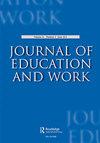Covid-19大流行对教育进步和工作技能学习的感知影响:关于英国年轻人的新证据
IF 1.7
Q2 EDUCATION & EDUCATIONAL RESEARCH
引用次数: 2
摘要
摘要:我们提供了关于疫情对青年影响的新证据,首次关注对工作技能学习和教育的感知影响。背景是脱欧后的英国。我们发现,在一个具有代表性的样本中,47%的年轻人认为他们失去了对工作技能的学习,而相当一部分人(17%)认为疫情改善了情况。直接感染新冠肺炎的人对技能丧失的看法更糟,在学校、学院或大学的人中,技能丧失的情况远比在职的人更糟。在那些受过教育的人中,那些只经历过在线学习的人对工作技能的学习损失更高,但那些有过一些工作经验的人则更低。在就业者中,培训减轻了学习损失,培训在疫情开始时急剧下降,但后来有所恢复,几乎没有偏离其长期趋势。平均培训量和学习损失感都没有受到“休假”的影响。最后,女性对失去工作技能学习的看法高于男性,威尔士和苏格兰也高于英格兰和北爱尔兰。本文章由计算机程序翻译,如有差异,请以英文原文为准。
Perceived effects of the Covid-19 pandemic on educational progress and the learning of job skills: new evidence on young adults in the United Kingdom
ABSTRACT We present new evidence on the pandemic’s effects on youth, for the first time focusing on perceived effects on the learning of job skills, as well as on education. The context is post-Brexit Britain. We find that 47% of young people in a representative sample perceive a loss of learning of job skills, while a sizeable minority (17%) judge that the pandemic improved matters. The perception of skill loss is worse among those encountering Covid directly, and far worse among those in school, college or university than among those in employment. Among those in education, loss of learning of job skills is higher among those experiencing only online learning, but lower for those who have had some work experience. Among those in employment, loss of learning is mitigated by training, which dropped sharply at the start of the pandemic but recovered and thereafter deviated little from its long-term trend. Neither the average amount of training, nor the perception of loss of learning, were affected by being placed on ‘furlough’ leave. Finally, perceptions of loss of learning of job skills were greater for women than for men, and greater in Wales and Scotland than in England and Northern Ireland.
求助全文
通过发布文献求助,成功后即可免费获取论文全文。
去求助
来源期刊

Journal of Education and Work
EDUCATION & EDUCATIONAL RESEARCH-
CiteScore
2.70
自引率
14.30%
发文量
40
期刊介绍:
The Journal of Education and Work is an international forum for academic research and policy analysis which focuses on the interplay of the education and economic systems. The journal examines how knowledge, skills, values and attitudes both about and for work and employment are developed within the education system. The journal also explores the various forms of industrial training and accreditation in the economic system, including changes in the economic and industrial infrastructure which influence the type of employees required. Work in the informal economy is also included.
 求助内容:
求助内容: 应助结果提醒方式:
应助结果提醒方式:


